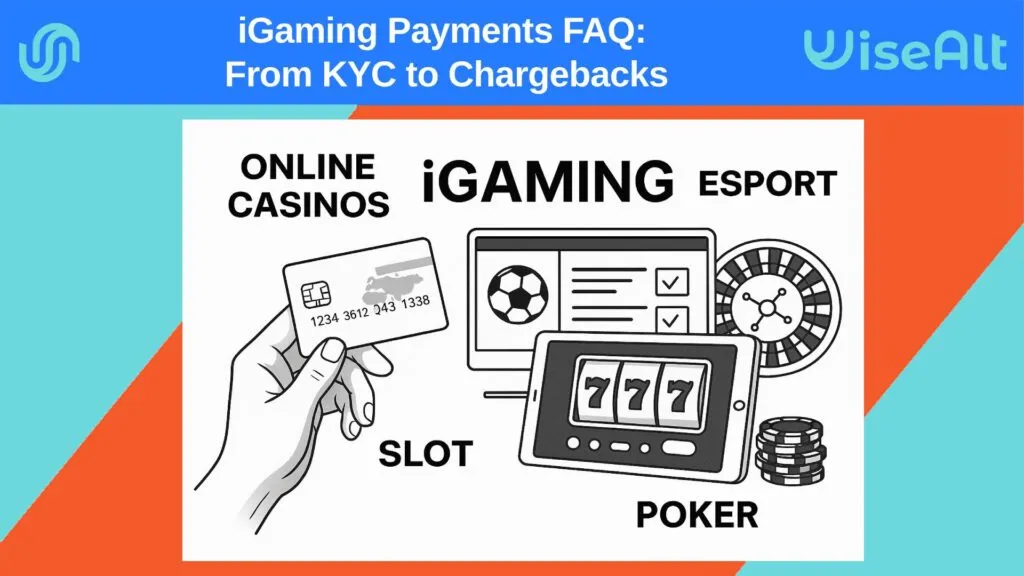Introduction
Whether you’re launching a licensed casino, scaling an esports betting site, or entering a new market, understanding how to accept payments for iGaming – ready is critical. This FAQ answers real questions from operators, helping you navigate KYC, chargebacks, APMs, crypto, and regulations like MiCA — all in one place.
1. What’s the right way to accept iGaming payments without getting flagged or blocked?
iGaming businesses require specialized merchant accounts with high-risk acquirers. These providers assign Merchant Identification Numbers (MIDs) under codes like MCC 7995 (Gambling), tailored to betting and casino use. Using a general MID may lead to frozen accounts or withheld funds.
The key is working with PSPs that support gambling traffic and set up correct routing by card type, country, risk score, and customer behavior.
2. What types of games are considered iGaming?
iGaming includes:
- Casino games (slots, roulette)
- Sports betting & fantasy sports
- Esports betting
- Poker and card games
- Virtual racing
- Games of chance (e.g. sweepstakes, wheel spins, RNG-based prizes)
“Games of chance” fall under iGaming when outcomes are not skill-based. These may require additional regulatory scrutiny in some countries. From a payments perspective, they present similar risk profiles and require comparable MIDs and compliance.
3. What KYC documents are required to open an iGaming merchant account?
There are two KYC layers:
- Player KYC: Required under AML laws — valid ID, proof of address, and source of funds (especially for VIPs).
- Business KYC/KYB: Required by PSPs and acquirers. It includes:
- Corporate documents
- iGaming license
- Passport and utility bill for directors and beneficial owners (UBOs)
- Proof of website ownership and operational model
PSPs also check for PEP exposure, negative media, and license validity.
4. How is the iGaming ecosystem structured (B2B vs B2C)?
- B2C (Business to Consumer): Casinos and sportsbooks operating under a license and accepting wagers directly from players.
- B2B (Business to Business): Game developers, white-label platform providers, data feeds, and affiliates.
B2B platforms don’t typically require gambling MIDs but may still be classified high-risk. B2C setups deal with KYC, chargebacks, and licensing complexity.
Many operators use B2B platforms (turnkey or white-label) to launch faster, while maintaining their own B2C licensing and MID setup.
5. What gambling licenses help you accept payments faster?
Preferred licensing jurisdictions:
- Curacao – Fast onboarding, crypto-friendly, cost-effective
- Malta (MGA) – Strong EU compliance, great for PSP compatibility
- Isle of Man – Respected in UK and Asia
- UKGC – Mandatory for UK-facing sites
- Spain, Sweden, Germany – Require local licenses and local PSPs
Countries like the USA, France, and Netherlands often block offshore MIDs and require localized payment routing through domestic financial institutions.
6. Can I accept crypto in iGaming legally? What are VASP and MiCA?
Yes, but it must be done via licensed VASP (Virtual Asset Service Provider) or CASP (Crypto Asset Service Provider) partners. The MiCA regulation (Markets in Crypto-Assets), which comes into force in the EU in 2025, mandates full registration, custody protocols, and wallet transparency.
Crypto payments:
- Lower chargeback risk
- Expand to underbanked users
- Must be linked to KYC/AML systems
7. What are iGaming chargebacks and how can I manage them?
Chargebacks are card disputes initiated by the player. Common triggers:
- Unauthorized transaction
- “I didn’t recognize this charge”
- Loss disputes (“I lost too much”)
- Abuse of health-based claims (“I have a gambling problem”)
Tips to reduce:
- Use clear billing descriptors
- Offer instant refunds when justified
- Implement 3D Secure, fraud scoring, velocity checks
- Keep chat logs and gameplay data for dispute evidence
According to Chargeback Gurus, card networks like Visa and Mastercard recommend keeping your chargeback ratio below 1% to avoid penalties, reserve holds, or MID termination. While iGaming is considered high-risk, going above this threshold increases your vulnerability to being blacklisted by acquirers.
8. Refund vs. chargeback — what’s the difference in iGaming?
- Refund = Voluntary return of funds to the player by the merchant. Keeps your MID clean.
- Chargeback = Involuntary reversal initiated by cardholder via issuing bank. Can hurt your reputation, MID score, and raise processing costs.
Whenever possible, offer proactive refunds for disputed claims — even in addiction-based abuse scenarios — to prevent escalation.
9. What are APMs (Alternative Payment Methods) and which work best for gambling?
APMs include any non-card method. They’re essential in many markets.
iGaming Payments – Best iGaming APMs
- Trustly, Sofort, iDEAL – Instant bank transfer in EU
- Skrill, Neteller – Gambling-friendly e-wallets (often expensive; onboarding faster via partners than directly)
- PIX, Boleto – Brazil
- UPI – India (not gambling-compatible officially)
- Apple Pay, Google Pay – Limited support in gambling
Avoid direct applications to APM providers — use licensed financial intermediaries for faster onboarding and better terms.
10. What is routing in iGaming payments and how is it optimized?
Routing is the logic of directing a transaction to the most appropriate PSP or acquirer based on:
- Card BIN
- User IP address
- Browser language
- Geo of the card
- Card scheme (Visa/Mastercard)
- Transaction size
Cascading = Automatically retries failed transactions on secondary MIDs.
Dynamic routing = Chooses the best processor in real-time based on success rates, cost, and geo.
Both methods improve conversion and lower decline rates.
11. How long does onboarding take for iGaming payment processing?
In ideal cases — 2 to 4 weeks (e.g., younger PSPs, simplified licenses).
For regulated, mature providers — 4 to 8+ weeks, especially with MGA – Malta Gaming Licensing Overview, UKGC – Gambling Compliance Requirements or crypto integrations.
At WiseAlt, we accelerate onboarding by submitting your application to multiple PSPs simultaneously, reducing time-to-approval and boosting your go-live flexibility.
12. What should I ask a PSP before integration?
- Do you support MCC 7995 and regulated iGaming traffic?
- How do you prevent chargeback abuse from health-related claims?
- Do you work with both B2B and B2C models?
- Can you handle multi-MID routing per region or product?
- What are your refund-to-chargeback stats?
- Do you support MiCA-ready crypto flows?
- Do you offer cascading and dynamic routing?
Need Help? Request a custom solution from WiseAlt
WiseAlt specializes in high-risk payment infrastructure for iGaming, casinos, and betting operators. We support fiat and crypto flows, local APMs, fraud prevention, and multi-jurisdiction licensing.


